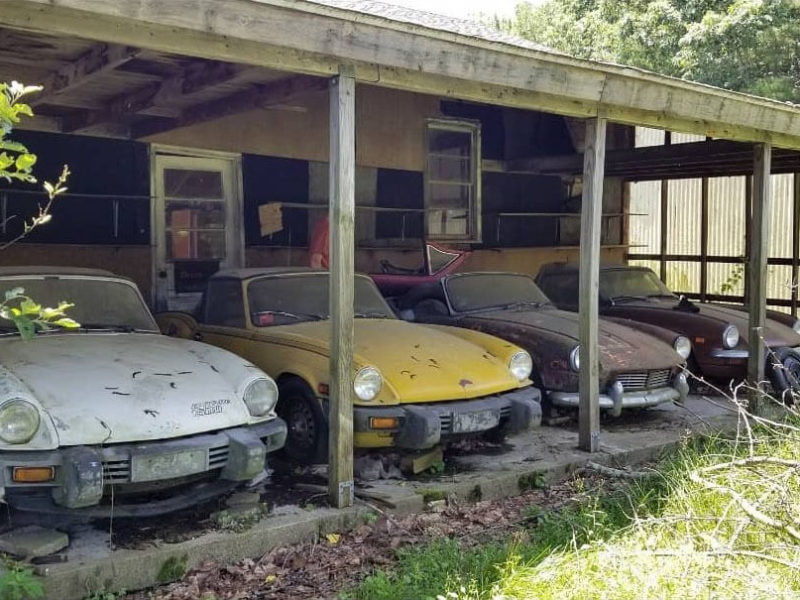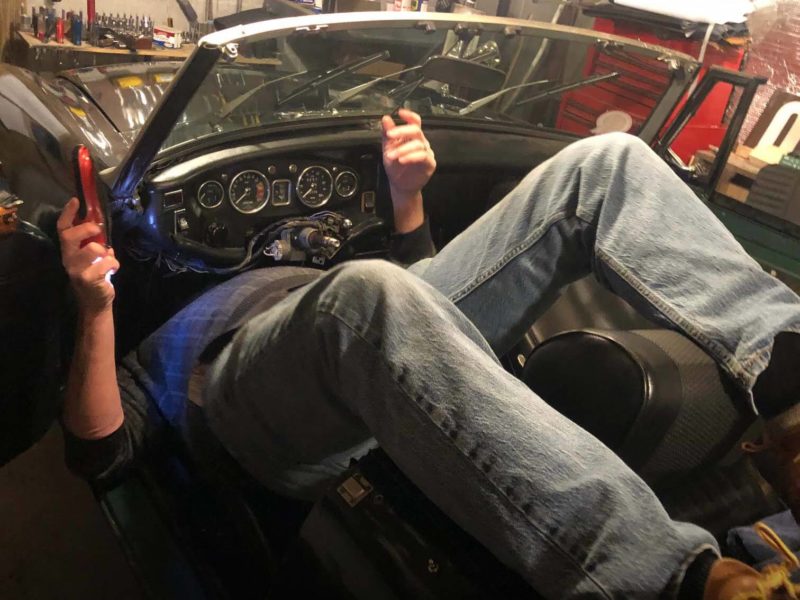After driving my 1963 Austin-Healey for 21 years and putting on about 27,000 miles, I decided to restore it and put the Healey back into what I hope to be mint condition.
While sitting there over the years on jack-stands, all of the brake and clutch fluid drained out (or disappeared somewhere). I know that I would need to rebuild the master cylinders. So I did, but when it came time to bleed the air from the lines, I couldn’t. Starting from the furthest most points, nothing worked. I pumped the master cylinders to no avail.
Here were the problems:
The clutch system turned out easy to fix because the bleeder screw was plugged with dirt. Therefore, loosening the screw did not permit the air, fluid (and dirt) to escape, permitting me to bleed the clutch system.
The brakes took a little longer, because I wanted to start bleeding the lines at the furthest wheel cylinder. Eventually, I closed off the rear cylinder, and started bleeding at the left front wheel cylinder. Voila! That line was filled with dirt, and by starting at that point, the brake system started to relieve itself of air and dirt. From there, I had no problem bleeding the system, starting at the furthest wheel cylinder and working back toward the master cylinder.
(If you suspect that the lines are partially or completely clogged with dirt, disconnect the lines at the wheel cylinders and or front brake hoses, and flush them with denatured alcohol. Best results are achieved when you can use an air compressor to blow the lines clear. If you place a small piece of tubing on the master cylinder end of the line, you can press the end of the air nozzle against the tubing-Ed.)
Jack Shepard
Marion, NC








'Clogged Brake Lines' have 5 comments
September 14, 2012 @ 7:45 am SteveK
I had the same problem with my 1980 MGB that I purchased in June. It had not been driven since 2007 but in general was rarely driven.
I replaced the master cylinder, the brake lines near the front wheels and in the back and the wheel cylinders. The brakes seem to be fine. When I started the job I never realized that I would replace so many pieces. I purchase an air compresser to blow out the lines. I keep the main metal brake lines but had to clean out the junction piece that connects the “rubber” lines in the back. It was just clogged.
This car was last driven before ethanol was added to the gas. This presented a real hazard. When I filled the tank I did didn’t understand why the fuel evaporation lines broke. I would replace one only to have another break a few days later. This could have caused a fire.
September 14, 2012 @ 7:49 am Tom Melvin
Jack,
Clever idea on flushing/cleaning your brake lines. But, man, you have a 50 year old Healey! I would invest in a full set of new brake lines if she were mine. Nice article, though.
Tom
September 14, 2012 @ 9:29 am Harry Mac Lea
When restoring a car or for that matter if a car is over 25 yrs old it is a good idea just to replace the rubber brake lines in your car. Not only do they plug with dirt, (how did it get there?) but they collapse as well and cause your calipers to not work or freeze due to not letting fluid go back and forth like it should. Also it’ s a good idea to replace the fluid in your system every 2-3 years.
September 14, 2012 @ 10:02 am Mark Yunker
I encountered a similar problem with a different source. I purchase a 40+ year old car. The brakes required an almost Herculean effort to stop the car, which the seller claimed was due to the manual drum brakes.
I replaced the master cylinder, brake shoes and wheel cylinders, and tried to bleed the brakes. No fluid would come out of the wheel cylinder bleeder plug. I disconnected the flexible hose from the wheel cylinder, but still no fluid. Disconnecting the hose from the steel line gave a full fluid flow. I cut the hose in two and found that it had swollen shut. I replaced all five flexible hoses and bled the brakes. the resulting system stopped evenly and powerfully with far less effort.
Since then, a complete brake system overhaul is the first thing I do when I buy any classic (or used) car.
July 4, 2023 @ 4:00 pm Betty and Jeff Cheyne
Hi Mark,
Thanks for your very helpful posting. My husband and I are trying to get a 1952 MGTD back on the road and we were having trouble bleeding the brakes. We feared the worst – having to replace the entire line. When we read your article we had hope, and sure enough the flexible hoses were the problem. My husband is now in the process of replacing them. Thanks again.